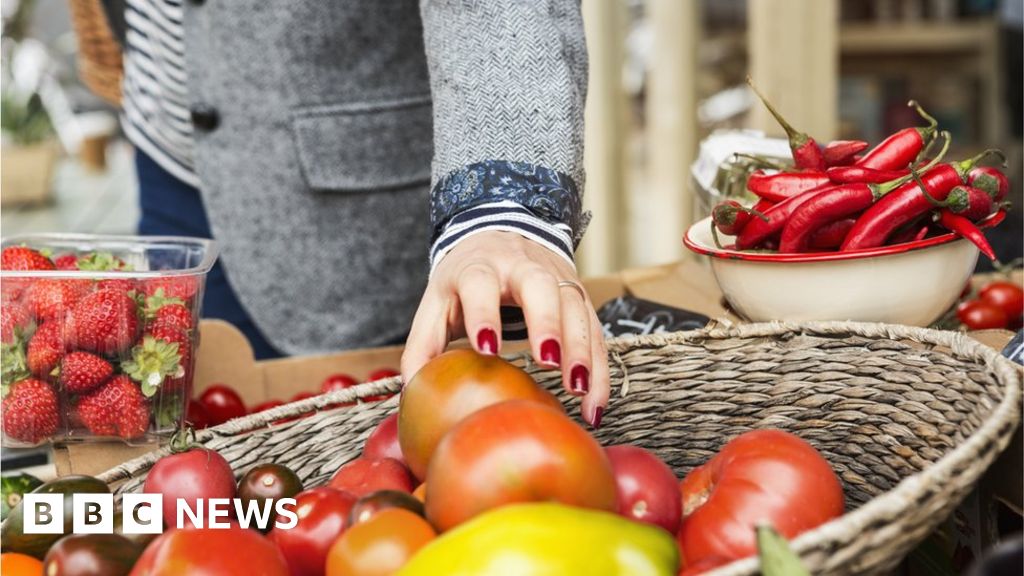UK Sleepwalking Into Food Supply Crisis, Says Farming Union

The UK is "sleepwalking" into a food supply crisis and the government must step in to help farmers, the National Farmers Union (NFU) has warned.
Yields of tomatoes and other crops will likely slump to record lows this year, it said, with potential supply problems ahead as already seen with eggs.
Soaring fuel, fertiliser and feed costs were putting farmers under severe pressure, it added.
The government said the UK has a "highly resilient food supply chain".
Some supermarkets are rationing egg sales after farmers cut back or halted production because of rising costs - a situation made worse by the Avian flu outbreak.
However, the NFU warned that food producers in other areas were now facing difficulties.
It said yields of energy-intensive crops like tomatoes, cucumbers and pears were likely to hit their lowest level this year since records began in 1985.
It also said milk prices were likely to fall below the cost of production, while beef farmers were considering reducing the number of cows they breed.
Rising costs were to blame, it said, with fertiliser prices for farmers more than tripling since 2019 and the cost of feed and diesel up by 75%.
Soaring energy costs, Brexit red tape and worker shortages were also factors, it added.
NFU president Minette Batters said British food was "under threat" with the future of British fruit and vegetable supplies "in trouble".
Already high food prices were sure to rise further if products became harder to source, she told BBC Radio 4's Today programme.
"This is about government prioritising food security, and if they fail to do so we will continue to see greater contradiction in our production, a reliance on more imports, and availability is just not going to be there," she said.
"We are self-sufficient in eggs - it's been a massive success story - and we now have 320 million less eggs for the same period this year than last year."
But Andrew Opie, director of food and sustainability at the British Retail Consortium, said that retailers were used to managing pressures across their supply chains.
"Supermarkets source, and will continue to source, the vast majority of their food from the UK and know they need to pay a sustainable price to farmers," he said, although they are facing additional costs.
Shoppers have been under pressure from the rapid pace of food price rises, although there are signs this may be starting to ease, according to market analysis firm Kantar.
Although food price inflation in the four weeks to 27 November was 14.6%, this edged down 0.1% from a record high in October.
This is the first time food price inflation has slowed in two years.
Costs challenge
The war in Ukraine and the coronavirus pandemic have driven up the price of food, energy and fuel over the last year, affecting consumers and businesses alike.
Grocery prices rose at their fastest rate for 45 years in the year to October, official figures show, with the cost of staples such as milk, cheese and eggs surging.
Steve Dresser, the boss of Grocery Insight, told the BBC that the big challenge comes from consumer appetite.
"Customers' focus is on saving money and local foods generally come at a higher price, which can be difficult," he said.
He said that rising prices meant farming "has taken a real battering this year".
He went on: "Food security is increasingly important, as we saw during lockdown restrictions and indeed the period afterwards that led to empty shelves.
Energy costs: Can growers in UK's cucumber capital survive?
"It's clear that we face real challenges in our supply chain and as a nation, we should be looking to back our farming community, especially as Brexit has made things harder around importing foods."
The NFU urged the government to do more to help farmers being pushed out of business, saying there were currently 7,000 fewer registered agricultural companies in the UK than in 2019.
And it wants ministers to consider giving emergency support to egg producers, given the recent disruption seen by consumers and farmers.
The NFU said the government should also lift the cap on seasonal overseas workers to tackle labour shortages and establish a new "food security" target to ensure enough food is produced domestically.
A Defra spokesman said: "Our high degree of food security is built on supply from diverse sources; strong domestic production as well as imports through stable trade routes."
He added that the government is in touch regularly with farmers and that the food and farming minister will meet with businesses in the egg industry on Tuesday.
From Chip War To Cloud War: The Next Frontier In Global Tech Competition
The global chip war, characterized by intense competition among nations and corporations for supremacy in semiconductor ... Read more
The High Stakes Of Tech Regulation: Security Risks And Market Dynamics
The influence of tech giants in the global economy continues to grow, raising crucial questions about how to balance sec... Read more
The Tyranny Of Instagram Interiors: Why It's Time To Break Free From Algorithm-Driven Aesthetics
Instagram has become a dominant force in shaping interior design trends, offering a seemingly endless stream of inspirat... Read more
The Data Crunch In AI: Strategies For Sustainability
Exploring solutions to the imminent exhaustion of internet data for AI training.As the artificial intelligence (AI) indu... Read more
Google Abandons Four-Year Effort To Remove Cookies From Chrome Browser
After four years of dedicated effort, Google has decided to abandon its plan to remove third-party cookies from its Chro... Read more
LinkedIn Embraces AI And Gamification To Drive User Engagement And Revenue
In an effort to tackle slowing revenue growth and enhance user engagement, LinkedIn is turning to artificial intelligenc... Read more

